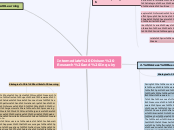Intermediate Divison Research and Inquiry
1. Preparing for Research
Stages to Facilitate Learning
Research is a complex and dynamic process() When engaged in research, the interplay of reading, writing and thinking skills as well as information and communication technology skills is essential for student success.
In this stage, students are given the parameters of the assignment: area of study, context for learning or performance task, intended audience, resource guidelines, timelines, and assessment.
Skills Taught and Explored
define information needs using several strategies such as role play and detailed outlines.
explore information using a variety of group activities such as ubject webs to explore connections between similar ideas
identify varied ways of organizing information such as planners, Web 2.0 mind mapping tools.
relate prior knowledge to information tasks
2. Access Resources
Strategies to Facilitate Learning
During the accessing stage, students need to search a wide range of print and digital resources to find the best material to support their research.
To be successful in accessing their resources in the inquiry and research process, the teacher librarian needs to guide the student to develop strategies. The teacher librarian in collaboration with the teacher helps the students identify pertinent resources effectively and efficiently.
The teacher librarian in cooperation with the teacher supports the learners by offering multiple resources to examine and evaluate, such as books, internet, periodicals, interviews, videos, and blogs.
Skills Taught and Explored
Effectively and efficiently find a variety of appropriate resources from a variety of sources to reference and cross reference.
Gather information from resources using internal organizers and conventions of texts.
Select information appropriate to needs using a variety of strategies such as development of generalizations, make inferences and conclusions.
Collaborate with peers and the digital community to share findings, ideas and explore topics with different points of view.
4. Transferring Learning
Strategies to Facilitate Learning
Learners learn how to choose the most appropriate format for communicating new learning.
Oral presentations are a strategy that provides opportunities to communicate via text, voice and visuals in a dynamic, creative way.
Planning, revising and reflecting are important strategies for the learner to understand how to transfer skills and knowledge to new and diverse situations.
Skills Taught and Explored
The learner must present their work in a progressive manner with their teacher ensuring a successful accomplishment. The student revises their work to address the appropriate audience and format.
Present research findings in a variety of forms for a variety of audiences to include digital and non digital formats.
Reflect on and evaluate product and process.
Transfer new information skills and knowledge to solve problems and make decisions.
3. Processing
Strategies to Facilitate Learning
The notes collected through research are reflected upon and reworked as students make connections, see patterns and relationships and draw inferences(). Web 2.0 visual organizers are useful processing tools. “Visual organizers are frames, matrices, grids, webs and similar forms used to represent knowledge in a visual format.” Ontario Curriculum Planner. CD-ROM. 2002.
Peer-to-peer discussions enables a collaborative approach that encourages and prompts questions, reflections and suggestions. The objective is to encourage learners to support other points of view and gain a deeper understanding of the information that they are processing.
Skills Taught and Explored
Analyze and evaluate information using a variety of strategies such as making inferences and convincing points of views with their peers.
The learner at this stage is testing concepts and adjusting their information.
At this stage the information the learner has gathered can be formatted in a variety of organizers having the option of using technology.
The learner is able to synthesize their findings and draw conclusions.
